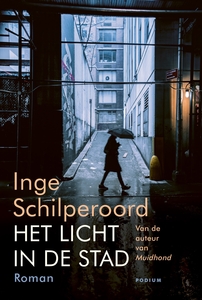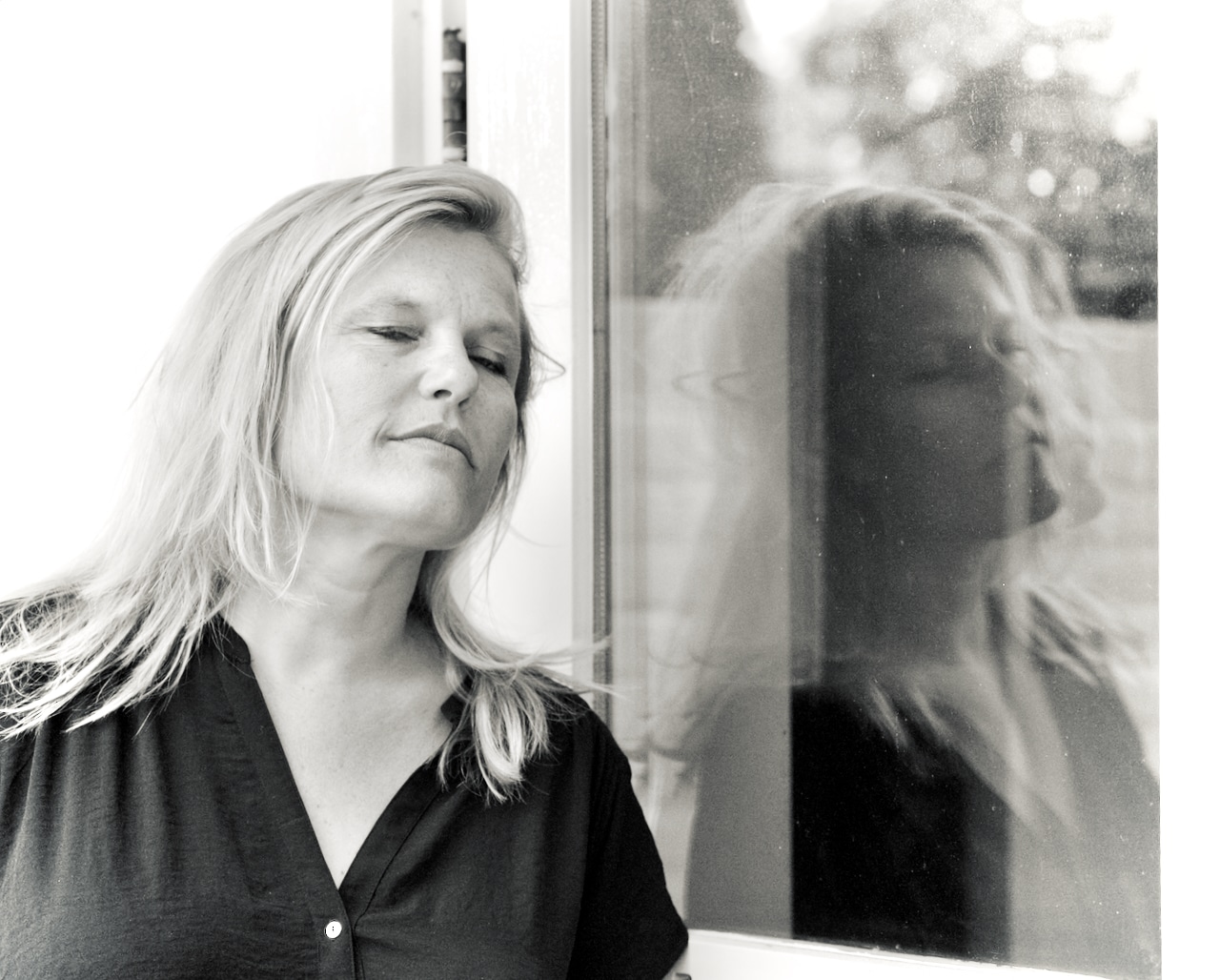Zeven jaar na haar bejubelde debuutroman Muidhond verschijnt het nieuwe boek van Inge Schilperoord. Ze dook in de belevingswereld van een jong Nederlands meisje dat zich aangetrokken voelt tot het islamitische geloof.
Toen Inge Schilperoord (49) als forensisch psycholoog in 2017 een tijd psychologische onderzoeken verzorgde op de terroristenafdeling van een gevangenis, waar mensen verblijven die verdacht worden van banden met terroristische organisaties zoals IS, diende het onderwerp voor haar nieuwe roman zich onherroepelijk aan. Ook al waren het niet allemaal bekeerlingen die ze sprak, ze raakte vooral gefascineerd door de belevingswereld van jongeren die zich hadden bekeerd tot de islam. En waren geradicaliseerd. Wat ging er in hen om? ‘Ik was er echt door gegrepen en mijn interesse kreeg langzaamaan wat obsessieve trekken, net als bij mijn eerste boek.’

Voor Het licht in de stad dook ze in de wereld van de islam, bekeerlingen en jihadisme. Haar hoofdpersoon Sophie is een Nederlandse puber die net haar vader verloren heeft. Als advocaat hield hij zich bezig met de verdediging van geradicaliseerde moslimjongeren, en hij liet zijn dochter kennismaken met de rituelen rondom de islam, de gebeden en gebruiken.
Na zijn dood zoekt Sophie daar steun in, en ze sluit vriendschap met haar Afghaanse klasgenote Zala. Tegelijk gaat ze online op zoek naar de jihadiste die haar vader verdedigde en aan wie hij de laatste maanden van zijn leven te veel tijd besteedde. Deze Isra El Hannouri werd door haar vader vrijgepleit, maar vertrok vervolgens alsnog naar het kalifaat van IS in Syrië. Sophie spoort haar op omdat ze antwoorden wil.
In uw roman zegt Sophies vader dat religieuze overtuigingen vaak niet de belangrijkste oorzaak zijn van extremisme, maar andere, persoonlijker motieven, zoals eenzaamheid, woede en het verlangen ergens bij te horen. Is dat inderdaad zo?
‘Laat ik vooropstellen dat ik geen wetenschappelijk onderzoeker ben op het gebied van moslimextremisme, ik kies juist voor een roman omdat ik wil schrijven over individuen, en niet over algemene oorzaken. Maar voordat ik wist dat ik hier een roman over wilde schrijven, heb ik dus wel verschillende mensen die verdacht werden van banden met het kalifaat psychologisch onderzocht. Wat me daarbij opviel, is dat die jongeren vaak in heel korte tijd waren geradicaliseerd, en dat velen van hen uit gezinnen kwamen waarin het geloof helemaal niet zo’n belangrijke rol speelde. Ze weten ook lang niet altijd veel van die religie af.
Het fascineerde me hoe jonge mensen geboren in een op het oog relatief comfortabel land als Nederland zó bezeten kunnen raken van een bepaald gedachtegoed, dat ze willen afreizen naar het kalifaat van IS. Het zijn, denk ik, vaak jongeren die zoekende zijn, zich verloren voelen in deze wereld en denken hierin hun heil te vinden, een bepaalde betekenis, een hoger doel. Ook Nederlandse bekeerlingen die ik heb gesproken, vertelden vooral dat ze een thuis hebben gevonden in het geloof. Die verschillende kanten wilde ik laten zien.’

Kon u zich in hen verplaatsen?
‘Tot op zekere hoogte. Aanvankelijk wilde ik een verhaal schrijven over een Nederlands meisje dat zich bekeert en vervolgens ook radicaliseert, maar gaandeweg vond ik het interessanter om een hoofdpersoon te hebben die juist sterk blijft twijfelen. Daar kon ik me ook beter in verplaatsen. Zelf ben ik atheïstisch opgevoed, maar als puber vond ik religie ook heel interessant. Ik haalde boeken uit de bieb over de verschillende geloven, en vond al die verhalen en rituelen heel mooi. Het was iets mysterieus en ik kon er ook wel met een zekere afgunst over lezen.
Vanuit wetenschappelijke kringen wordt er vaak wat denigrerend over het geloof gesproken, alsof religieuze mensen in een sprookje geloven. Mij leek het wel prettig, zo’n vorm van houvast, en de transcendentie, maar toch heb ik me daar nooit echt mee kunnen verbinden. Ook die vraag fascineerde me: waarom lukt het de een wel om zich daarvoor open te stellen, en de ander niet?’
Uw hoofdpersoon Sophie worstelt hier ook mee: ze voelt zich aangetrokken tot het islamitische geloof, overweegt zelfs zich te bekeren, maar kan zich er toch niet helemaal aan overgeven.
‘Sophie is een jong, wit meisje dat zich eenzaam voelt en zoekt naar iets groters waar ze in op kan gaan. Ze voelt zich aangetrokken tot het islamitische geloof, tegelijkertijd lukt het niet om daar echt bij te komen, en de frustraties daarover maken haar nog eenzamer. Ze voelt jaloezie voor jongeren die daar helemaal voor gaan, omdat zij echt lijken te weten wat ze betekenen, een antwoord hebben gevonden op het lege gevoel van: voor wie of waarvoor leef ik eigenlijk?
We leven in een complexe tijd met grote bedreigingen. Dus ik kan me wel voorstellen dat het knap ingewikkeld is om nu jong te zijn, en dat zo’n eenduidig antwoord dan aantrekkelijk kan zijn, misschien nog meer dan toen ik zelf zo oud was. Of dat nou moslimextremisme is, of extreemrechts of extreemlinks.
Natuurlijk had ik van te voren zelf ook vooroordelen. Zo dacht ik dat veel van die Hollandse vrouwen die zich tot de islam hebben bekeerd, dat waarschijnlijk hadden gedaan vanwege een relatie met een islamitische man. Dat bleek bij geen van de vrouwen die ik heb gesproken het geval; het verlangen zich tot de islam te (be)keren kwam echt uit henzelf.’
Coming-out-proces
Het is vermoedelijk ook niet iets waar iemand lichtvaardig toe besluit?
‘Nee, want maatschappelijk gezien stuit het op veel weerstand. De meeste meisjes en vrouwen die ik heb gesproken waren bang om het te vertellen aan hun omgeving. Het is soms echt een coming-out-proces. Op een bijeenkomst van bekeerlingen vroegen ze aan elkaar: heb jij het al durven vertellen? Hoe reageerde je vader? In veel witte gezinnen is het in de huidige tijd denk ik makkelijker om uit de kast te komen als lhbtiq+ dan als moslim. Dat vind ik opmerkelijk. Er is best veel discriminatie in Nederland ten aanzien van moslims. Veel jonge vrouwen vertelden dat ze werden uitgescholden op straat toen ze een hoofddoek gingen dragen. Dat maakt hun gevoel van geïsoleerd zijn natuurlijk alleen nog maar groter.
Natuurlijk snap ik dat je als ouder niet direct staat te springen als je kind ineens gelovig wordt, als jij dat zelf niet bent, helemaal als het gaat om een geloof dat voor veel Nederlanders relatief onbekend is. Maar de bekeerlingen die ik sprak zaten vol goede intenties en vonden juist veel moois in de islam. Dus wat is daar uiteindelijk zo erg aan?’
Inge Schilperoord, Het licht in de stad (224 p.), Podium, € 22,50
Over Inge Schilperoord
Inge Schilperoord (1973) is forensisch psycholoog voor onder meer het Pieter Baan Centrum en schrijver. Naast een vaste maandelijkse column in Psychologie Magazine en regelmatige recensies voor Trouwpubliceerde ze artikelen, essays en verhalen in onder meer NRC Handelsblad, De Groene Amsterdammer, Hollands Maandblad en de Volkskrant. In 2015 verscheen haar debuut Muidhond, die lovende recensies kreeg en werd bekroond met de Bronzen Uil. Ook stond het boek op de shortlist van alle andere grote literaire prijzen. Het boek werd vertaald in zeven talen en in 2019 ook verfilmd; in 2020 won de film de publieksprijs op het filmfestival van Gent en van Seoul.
